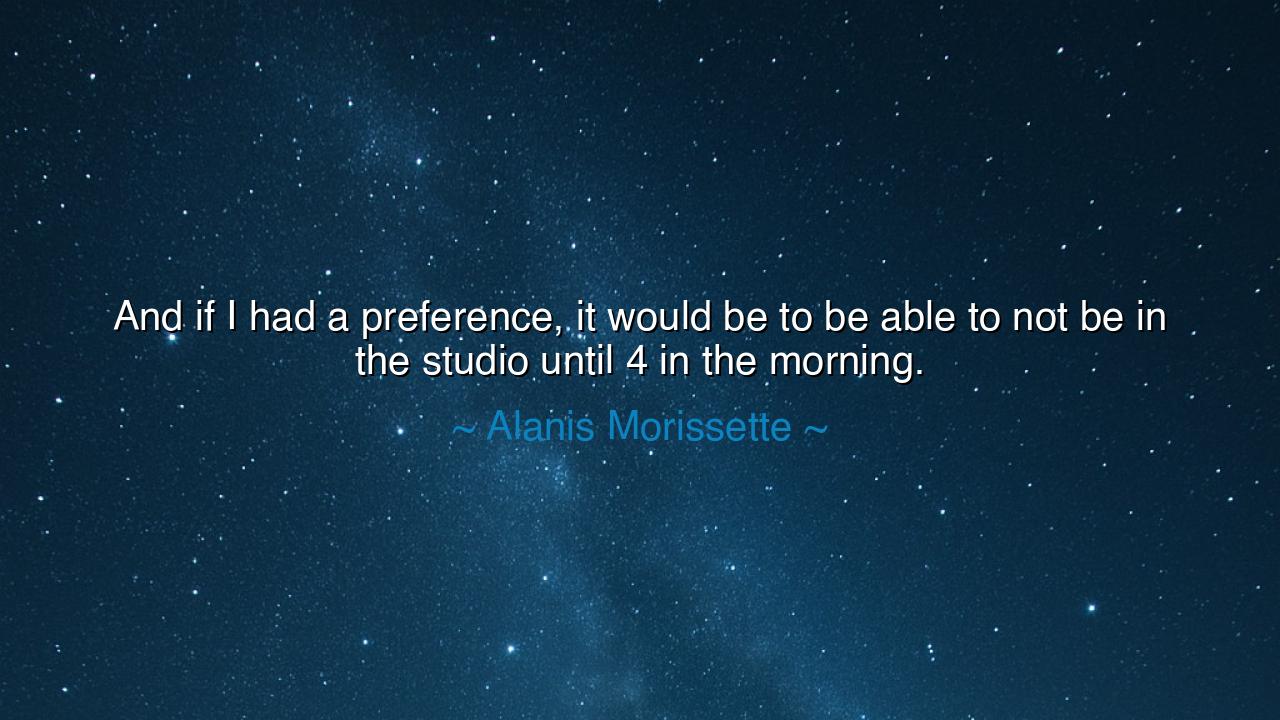
And if I had a preference, it would be to be able to not be in
And if I had a preference, it would be to be able to not be in the studio until 4 in the morning.






Alanis Morissette, singer of raw honesty and seeker of balance, once confessed: “And if I had a preference, it would be to be able to not be in the studio until 4 in the morning.” At first glance, these words seem light, even casual — the lament of a weary musician. Yet beneath them lies a deeper truth about the struggle between art and life, creation and rest, discipline and the human need for wholeness. For what she reveals is not merely fatigue, but the longing for harmony, the desire that passion not consume the very vessel through which it flows.
The ancients understood this balance well. Aristotle spoke of the “golden mean” — the path between extremes of excess and deficiency. The poet who burns through the night may create works of fire, yet may also burn out their body and spirit. The warrior who trains without rest may sharpen his blade, yet dull his life. Morissette’s words remind us that preference is not weakness, but wisdom: the recognition that the human soul thrives not in endless strain, but in balance between work and renewal.
History, too, offers testimony. Consider Wolfgang Amadeus Mozart, whose brilliance demanded long hours of composition, performance, and teaching. His nights often stretched into mornings, yet the relentless pace wore his body and spirit. His genius was unmatched, but his life was cut short, in part by exhaustion. His story is a cautionary echo of Morissette’s truth: that creation without rest extracts too heavy a price, and that even the brightest flame can be extinguished when not tended wisely.
Yet Morissette’s words are not only caution but confession of humanity. To be in the studio until 4 in the morning is the reality of devotion, of an artist unwilling to compromise the integrity of her craft. And yet, to wish for a gentler rhythm is to remind both herself and her listeners that art is not separate from life, but part of it. For what good is a song that steals the singer’s health? What good is a masterpiece if the maker is broken? True artistry must nourish both the world and the one who creates it.
There is a heroic undertone here as well. Many great achievements in history have come from those who labored beyond the hours of ordinary men. Thomas Edison, working by the dim glow of lamps, tested thousands of filaments before discovering the light that now fills our homes. Soldiers, leaders, explorers — all have known nights of sacrifice. Yet even they, when wise, sought renewal, for no campaign, no voyage, no invention can endure if its leaders are destroyed by their own exertion. Thus Morissette’s wish is both deeply personal and universally human: the longing for a life where creation and rest walk hand in hand.
The lesson is clear: do not despise your limits, for they are the guardians of your strength. To work hard is noble, but to work without end is folly. The preference for balance is not weakness, but wisdom. Practical action flows from this — set boundaries for your labor, honor the rhythms of day and night, let rest feed your creativity. In doing so, you preserve not only your body, but the wellspring of inspiration itself.
So remember, O seekers of wisdom: Morissette’s weary words are more than complaint. They are a reminder to all who labor in art, in business, in life itself, that the soul is not made for endless toil. Let your work be passionate, yes, but let your nights bring rest. For in balance lies endurance, and in endurance lies greatness. And those who honor both the fire of labor and the stillness of rest will not only create, but will live fully — strong, whole, and radiant.






AAdministratorAdministrator
Welcome, honored guests. Please leave a comment, we will respond soon